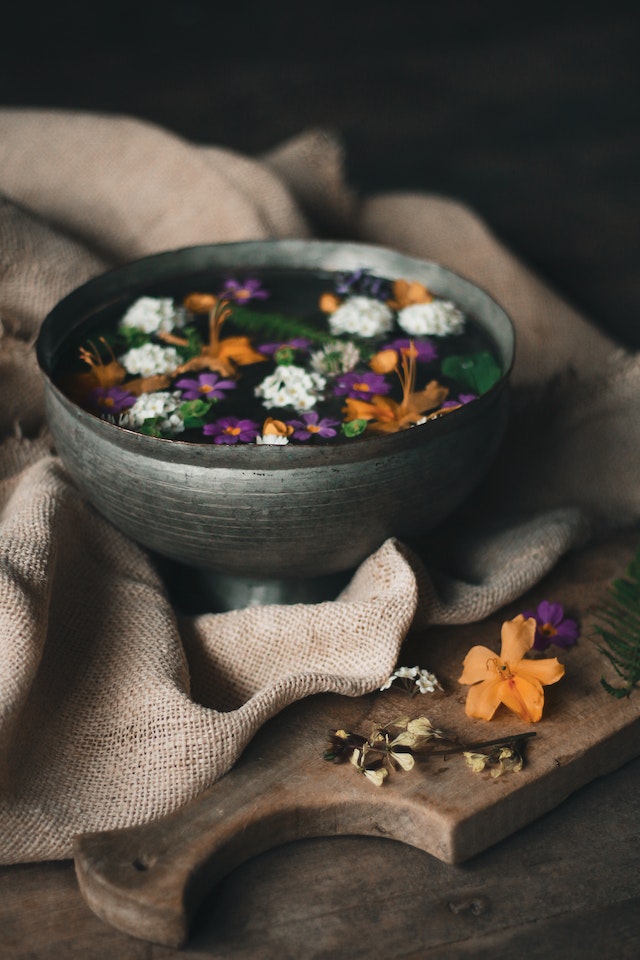Sinus infections, also known as sinusitis, are a common and often frustrating issue for millions of people. Symptoms can include nasal congestion, headaches, facial pain, and even fever. While over-the-counter medications and antibiotics are often used to treat these infections, many people are looking for more natural alternatives. Herbal remedies for sinus infection have been used for centuries to treat various ailments, and they continue to gain popularity for those seeking holistic options.
Disclaimer: This article is provided for informational purposes only and should not replace professional medical advice. Please consult with a qualified healthcare practitioner or herbalist before using any herbal remedies.

One way people are turning to herbal remedies is by using medicinal plants with antimicrobial, anti-inflammatory, or pain relieving properties. These herbs can help alleviate the symptoms of sinus infections and potentially help fight the underlying cause of the infection itself. Examples of such remedies include eucalyptus, ginger, and peppermint, which are known for their ability to reduce inflammation and congestion, making it easier to breathe and promoting natural healing.
Incorporating herbal remedies for sinus infection treatment is an attractive option for many who prefer a more natural approach to their health. It’s important to consult with a healthcare professional before starting any new treatments or supplements, as some herbs may interact with medications or may not be suitable for certain individuals. By exploring these natural options, those suffering from sinus infections can potentially find relief and improve their overall well-being.
Understanding Sinus Infections
Sinus infections, also known as sinusitis, occur when the lining of the sinus cavities becomes inflamed. This inflammation can lead to a variety of symptoms, including nasal congestion, runny nose, and facial pain. Sinus infections can be classified into acute and chronic sinusitis, depending on the duration and severity of symptoms.
Acute sinusitis typically lasts for a short period of time, usually caused by a viral or bacterial infection. The nasal passages become inflamed, producing excess mucus and blocking the sinus cavities. This can lead to sinus congestion, facial pain, and sinus headaches. In some cases, upper respiratory infections may also contribute to the development of acute sinusitis.
Chronic sinusitis, on the other hand, is a more persistent form of sinus infection. It is often characterized by recurrent or ongoing symptoms, which may last for several months or even years. Chronic sinusitis can occur due to various reasons, such as nasal cavity abnormalities, allergies, or persistent bacterial infections. Chronic rhinosinusitis is a related condition that involves the inflammation of both the sinus and nasal cavities.
Sinus infection symptoms often overlap with those of other respiratory conditions, which can make it challenging to identify the root cause. Common symptoms of sinusitis include nasal blockage or congestion, runny nose, facial pain or pressure, and a reduced sense of smell. In more severe cases, fever and sinus pain may also be present.
It is essential for sinus sufferers to recognize the symptoms and seek appropriate treatment to prevent complications and alleviate discomfort. Herbal remedies can offer a natural alternative to conventional treatments, targeting various aspects of sinus infections such as reducing inflammation, fighting bacterial infections, and relieving nasal congestion. By understanding sinus infections and their causes, individuals can make informed decisions about the best course of action for managing their sinus problems.
Popular Herbal Remedies for Sinus Infections
Sinus infections can cause discomfort, pain, and congestion. Many people turn to herbal remedies as a natural alternative to conventional medications. These remedies have been used for centuries to alleviate symptoms related to sinus infections. In this section, we will explore some popular herbal remedies for sinus infections.

Eucalyptus oil is widely used in aromatherapy and can help clear nasal congestion when inhaled. It is known for its anti-inflammatory and antibacterial properties, making it a popular choice for treating sinus infections. Add a few drops of the oil to a bowl of hot water and inhale the steam to soothe your nasal passages and alleviate congestion.
Herbal teas are a comforting way to ease sinus infection symptoms. One popular choice is ginger tea, which has both anti-inflammatory and analgesic properties. Drinking ginger tea can help reduce inflammation and relieve sinus-related pain. Other herbal teas known for their sinus-clearing properties include peppermint tea and chamomile tea.
Apple cider vinegar has long been considered a natural remedy for many health issues, including sinus infections. Dilute a tablespoon of apple cider vinegar with warm water and drink the mixture to help break up mucus and relieve sinus congestion.
Essential Oils
Essential oils are another popular remedy for sinus infections. Apart from eucalyptus oil, other essential oils such as peppermint, lavender, and oregano oil have been reported to help clear congested sinuses. You can diffuse the oils in your living space or add a few drops to a warm bath to experience their soothing effects.
Incorporating herbal medicine can also be beneficial in the treatment of sinus infections. Some people take herbal supplements like quercetin or bromelain to reduce inflammation and promote sinus health. These supplements are available in capsule or tablet form and can be found in natural health stores or online.
Overall, herbal remedies offer a natural and gentle approach to treating sinus infections. However, it’s important to note that herbal remedies might not work for everyone, and it’s always best to consult a healthcare professional before trying new treatments. Rest, hydration, and a healthy diet can also contribute to the healing process.
Home-made Sinus Rinses and Nasal Irrigation Techniques
Sinus infections can be quite discomforting, and utilizing home-made sinus rinses and nasal irrigation techniques can provide relief. Nasal irrigation helps in clearing out mucus and reducing inflammation, making it an effective method for managing sinus infections.
One common method of nasal irrigation is using a neti pot, a small container with a spout, designed to pour saline solution into one nostril while allowing it to flow out the other. To make your own saline solution, combine 1/4 teaspoon of non-iodized salt and 1/4 teaspoon of baking soda in 8 ounces of warm distilled or sterile water. Using distilled or sterile water is crucial to prevent the introduction of harmful microorganisms into the nasal passages.
Apart from neti pots, bulb syringes or squeeze bottles can also be used for nasal irrigation. These devices make it easy to control the pressure and flow of the saline solution during the process. Always remember to maintain cleanliness and follow the manufacturer’s cleaning instructions to avoid infections.
Certain homemade sinus rinse recipes can also be found online, such as those including baby shampoo or xylitol. These ingredients have been reported to help with breaking down biofilms in the nasal passages and reducing sinus-related symptoms. However, it’s essential to consult a healthcare professional before trying these unconventional approaches.
Cautions
While tap water might seem like a convenient option, it is not recommended for making sinus rinses. Tap water may contain bacteria or other contaminants that could worsen the sinus infection or lead to other health issues. Instead, opt for distilled water, sterile water, or previously boiled and cooled water for preparing saline solutions.
In summary, homemade sinus rinses and nasal irrigation techniques can be effective in managing sinus infections. Utilizing neti pots or other devices, and preparing saline solutions with distilled or sterile water can provide relief from discomfort. Always practice good hygiene and consult a healthcare professional if you are unsure about any steps or ingredients in the process.
Benefits of Steam Inhalation and Hot Showers
Steam inhalation and hot showers are popular and natural remedies for relieving sinus infection symptoms. Inhaling steam can help soothe and moisturize the nasal passages, easing congestion and making it easier to breathe.
Steam inhalation involves breathing in water vapor produced from a pot of hot water or a commercially available facial sauna. This method helps to open up the sinuses and encourages drainage of mucus, providing relief from sinus pressure and discomfort. When practicing steam inhalation, it’s essential to maintain a safe distance from the hot water to avoid burns or scalds.
Similarly, taking a hot shower or immersing oneself in a warm, steamy bathroom can also offer relief from sinus infections. The warm water and steam help to dilate blood vessels, which in turn improves circulation and loosens mucus. This not only helps to alleviate congestion but also promotes relaxation and reduces stress levels, which can sometimes exacerbate sinus issues.
Drinking hot liquids, such as herbal teas or warm water with honey and lemon, can also help to loosen mucus and soothe inflamed nasal passages. This can make breathing easier and provide relief from sinus pain and pressure. However, it’s important not to rely solely on hot liquids as a treatment for sinus infections, as medical interventions may be necessary for more severe cases.
In conclusion, steam therapy through steam inhalation and hot showers is a helpful and natural way to alleviate sinus congestion and discomfort. Although these methods may not cure the underlying infection, they can provide temporary relief and improve the quality of life for those suffering from sinusitis. It’s important to use these remedies safely and consult with a healthcare professional if symptoms do not improve or worsen.
Incorporating Dietary Supplements for Sinus Relief

Incorporating dietary supplements into your daily routine may help alleviate the symptoms of sinus infections. These supplements not only provide nutrients needed for a healthy immune system but also support the body’s natural defense mechanisms.
One widely recognized supplement for sinus relief is vitamin C. This essential nutrient is known for its immune-boosting capabilities, antioxidative properties, and involvement in collagen production; which, in turn, helps maintain the integrity of the mucosal linings within the nasal passages. An increased intake of vitamin C can potentially aid in reducing the duration and severity of sinus infections.
Apart from vitamin C, other dietary supplements that may offer sinus relief include:
- Quercetin: A natural flavonoid found in various fruits and vegetables, Quercetin possesses anti-inflammatory and antioxidant properties that may help reduce nasal congestion.
- Bromelain: Derived from pineapple stems, Bromelain is an enzyme with anti-inflammatory and mucolytic effects. It can help break down and remove excess mucus in the sinuses, which ultimately facilitates comfortable breathing.
- Butterbur: A perennial shrub, Butterbur extract can be taken in supplement form and is known to possess anti-inflammatory actions. It may be helpful in reducing sinus headaches, nasal congestion, and related symptoms.
Before incorporating any dietary supplements into your regimen, it is essential to consult with a healthcare professional to ensure their suitability and to determine the correct dosage. It is important to remember that supplements should not replace a balanced diet but can be taken in conjunction to support overall health and well-being. By integrating appropriate dietary supplements under the guidance of a healthcare professional, you may be able to find relief from sinus-related discomfort and improve your overall sinus health.
Practical Lifestyle Changes for Sinus Relief
Sinus infections can be uncomfortable and disruptive to daily life. Fortunately, there are several practical lifestyle changes that can help alleviate symptoms and promote overall good health. In this section, we will discuss ways to support the immune system, maintain healthy mucus membranes, and reduce exposure to common irritants.
First, maintaining a strong immune system is crucial in preventing sinus infections. Eating a healthy diet full of fruits, vegetables, and lean proteins can provide the body with essential nutrients needed for optimal immune function. Additionally, engaging in regular physical activity, getting enough sleep, and managing stress can further support a robust immune system.
Healthy mucus membranes are also essential for sinus health, as they help to trap and expel irritants and allergens. Staying well-hydrated is key to keeping mucus membranes functioning properly, so aim to drink an adequate amount of water each day. Using a humidifier in dry environments can also help to keep mucus membranes moist and better able to filter out irritants and allergens.
Lifestyle Changes
Reducing exposure to common irritants, such as cigarette smoke and allergy triggers, can help to minimize the risk of sinus infections. Refrain from smoking, and avoid environments where cigarette smoke is present. For those who suffer from allergic rhinitis or hay fever, identifying and avoiding allergens can help prevent sinus symptoms.
In some cases, nasal polyps can contribute to sinus infections and problems with nasal congestion. If nasal polyps are present, it’s important to work with a healthcare professional to determine the best course of treatment, which may include medication or even surgery.
Using a saline nasal spray or salt water rinse can help to soothe a sore throat, relieve stuffy noses, and alleviate other cold symptoms. Be mindful that using salt water rinses may not be appropriate for individuals with high blood pressure, so it’s always best to consult a healthcare professional before starting any new treatment.
In conclusion, adopting practical lifestyle changes such as maintaining a healthy immune system, keeping mucus membranes in optimal condition, and minimizing exposure to irritants can help to provide relief from sinus symptoms and reduce the risk of recurrent sinus infections.
Natural and Effective Home Remedies
Sinus infections can be quite bothersome, but there are natural and effective home remedies that may provide relief. One popular home remedy is using a warm compress. Applying a warm, moist cloth to the affected area can help alleviate sinus pressure and reduce inflammation. To create a warm compress, simply soak a clean towel in warm water, wring out the excess water, and place it over your forehead and nose for about 15 minutes. Make sure to reheat the cloth as needed to maintain a comfortable temperature.
Staying well-hydrated is also essential when dealing with a sinus infection. Drinking plenty of water, especially warm water, can help thin the mucus and make it easier for the sinuses to drain. Aim to drink at least 8 cups of water per day and avoid dehydrating beverages like alcohol and caffeine. Keeping the body hydrated can also reduce bad breath, which is a common symptom of sinus infections.
Saline Rinses
Another natural and effective home remedy for sinus infections is using saline nasal sprays or rinses. These can help flush out excess mucus and allergens while moisturizing the nasal passages. A saline solution can be easily made at home by mixing 1 teaspoon of non-iodized salt with 2 cups of warm water. Use a bulb syringe, neti pot, or nasal spray bottle to gently rinse the nostrils with the saline solution. Make sure to clean the device thoroughly after each use to prevent re-infection.
In addition to these remedies, incorporating immune-boosting ingredients into your daily routine can help support the body’s natural response to sinus infections. Some popular herbs and supplements that may promote immune health include echinacea, garlic, and vitamin C. While these ingredients may not cure a sinus infection, they can potentially help reduce the severity and duration of symptoms.
Remember to consult with a healthcare professional before using any home remedies for sinus infections, especially if your symptoms persist or worsen. While these natural and effective remedies can provide some relief, it’s essential to ensure that the root cause of the sinus infection is being addressed.
Understanding and Addressing Potential Side-effects
Herbal remedies for sinus infections have gained popularity due to their natural origins and minimal side effects compared to conventional medications. However, it is crucial to be aware of potential side effects and how to address them in order to use these remedies safely and effectively.
One possible side effect of using herbal remedies for sinus infections is eye irritation. This can occur when certain herbs are applied too close to the eyes. The good news is that this issue can be easily mitigated by maintaining a safe distance between the herbal remedy and the eyes during application. When using a nasal spray or inhalation method, ensure the head is positioned properly to avoid contact with the eyes.
While herbal remedies are generally considered safe, some herbs might not be suitable for everyone. Pregnant women should be cautious when using herbal remedies for sinus infections, as certain herbs may have adverse effects on pregnancy. It is highly recommended that pregnant women consult with their healthcare professional before using any herbal remedies.
Possible side effects
Despite the overall positive reputation of herbal remedies for sinus infections, certain individuals may still experience side effects. These can range from mild to moderate and include symptoms such as allergic reactions, digestive issues, or headaches. To minimize these risks, it is essential to begin with a low dose of the herbal remedy and gradually increase it as necessary, while closely monitoring any potential side effects.

It is important to note that herbal remedies may interact with other medications, which can potentially increase the chances of side effects. To minimize this risk, consult a healthcare professional about possible interactions, especially when taking prescription medications or other herbal supplements.
In conclusion, herbal remedies for sinus infections can be a beneficial alternative to conventional treatments, but their potential side effects should not be overlooked. By understanding these risks and taking the necessary precautions, users can confidently incorporate these remedies into their sinus infection treatment plan while maintaining their overall well-being.
When to Seek Medical Intervention
While herbal remedies can provide relief for sinus infections, there are instances when medical intervention is necessary. It’s important to know when to seek professional help and explore other treatment options, such as over-the-counter (OTC) medications, balloon sinuplasty, or joining a clinical trial.
If you experience severe or persistent sinus infection symptoms, it’s time to make an appointment with your healthcare provider. They can provide guidance on the right course of action and prescribe medication or treatments when necessary.
When to Seek a Doctor
Some of the following symptoms warrant a visit to the doctor:
- High fever that lasts longer than three days
- Intense facial pain or headache
- Swelling or redness around the eyes
- Vision changes
- Neck stiffness
- Confusion or difficulty thinking clearly
- Shortness of breath
In addition to herbal remedies, OTC medications such as pain relievers, decongestants, and saline nasal sprays can offer temporary relief from sinus infection symptoms. However, if these treatments aren’t effective, your doctor may recommend other treatment options like antibiotics or steroid nasal sprays.
Balloon sinuplasty is a minimally invasive procedure that can provide long-term relief for chronic sinusitis sufferers. This procedure involves inflating a small balloon to expand the sinus pathways, allowing for better drainage and reduced inflammation. Your healthcare provider can help determine if you’re a good candidate for this treatment.
Finally, those seeking alternative treatments for chronic or recurrent sinus infections may consider participating in a clinical trial. Clinical trials can provide access to experimental treatments and procedures that may not yet be available to the general public. It’s essential to discuss the risks and benefits with a healthcare professional before committing to a trial.
Remember, while herbal remedies can offer support in managing sinus infection symptoms, it’s crucial to consult your healthcare provider when dealing with severe or persistent symptoms. They can help ensure you receive the most appropriate care and explore other treatment options when necessary.








3 Comments on “Herbal Remedies for Sinus Infection: Effective Natural Treatments”